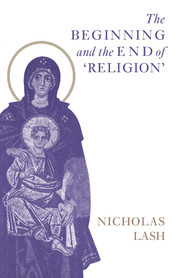Book contents
- Frontmatter
- Contents
- Preface
- PART ONE A MEETING-PLACE FOR TRUTH
- PART TWO EMERGING FROM MODERNITY
- 4 Observation, revelation and the posterity of Noah
- 5 On what kinds of things there are
- 6 Contemplation, metaphor and real knowledge
- 7 When did the theologians lose interest in theology?
- 8 Anselm seeking
- 9 Creation, courtesy and contemplation
- 10 Hollow centres and holy places
- 11 Hoping against hope, or Abraham's dilemma
- 12 Eagles and sheep: Christianity and the public order beyond modernity
- 13 Incarnation and determinate freedom
- 14 Beyond the end of history?
- List of works cited
- Index
9 - Creation, courtesy and contemplation
Published online by Cambridge University Press: 05 March 2012
- Frontmatter
- Contents
- Preface
- PART ONE A MEETING-PLACE FOR TRUTH
- PART TWO EMERGING FROM MODERNITY
- 4 Observation, revelation and the posterity of Noah
- 5 On what kinds of things there are
- 6 Contemplation, metaphor and real knowledge
- 7 When did the theologians lose interest in theology?
- 8 Anselm seeking
- 9 Creation, courtesy and contemplation
- 10 Hollow centres and holy places
- 11 Hoping against hope, or Abraham's dilemma
- 12 Eagles and sheep: Christianity and the public order beyond modernity
- 13 Incarnation and determinate freedom
- 14 Beyond the end of history?
- List of works cited
- Index
Summary
AN AGE OF UNREASON
On 5 October 1994, forty-eight members of an apocalyptic cult known as the Order of the Solar Temple died in Switzerland in horrifying circumstances. Twenty-three bodies were found in a burned-out farmhouse in Cheiry, near Fribourg, and a further twenty-five in ‘two devastated chalets in Granges-sur-Salvan, on the Italian border’. There were empty champagne bottles lying on the floor of the farmhouse. Some of the dead seem to have been suffocated, some shot, and some ‘were wearing red and black cloaks, reflecting an alternative name for the group, The Cross and the Rose’.
The next day, the Guardian published an article, reflecting on the tragedy, by Maureen Freely, entitled: ‘Mysterious power of the age of unreason’. The first sentence taught her by her father (a man whom she describes as having been ‘cured of Catholicism by a doctorate in physics’) was, she tells us, ‘God does not exist.’ The daughter learnt her lesson well, and is now simply baffled by the number of buildings full of apparently sane adults who ‘bow their heads’, confident that ‘they are not speaking to themselves, but to a larger power’.
However, as an honest woman, she admits that she herself takes part in ‘many cults’: ‘Every time I make myself available for surgery’, she says, ‘or have a baby, or fasten my seat-belt on an aeroplane, I am giving myself over to a larger power.’
- Type
- Chapter
- Information
- The Beginning and the End of 'Religion' , pp. 164 - 182Publisher: Cambridge University PressPrint publication year: 1996
- 1
- Cited by

